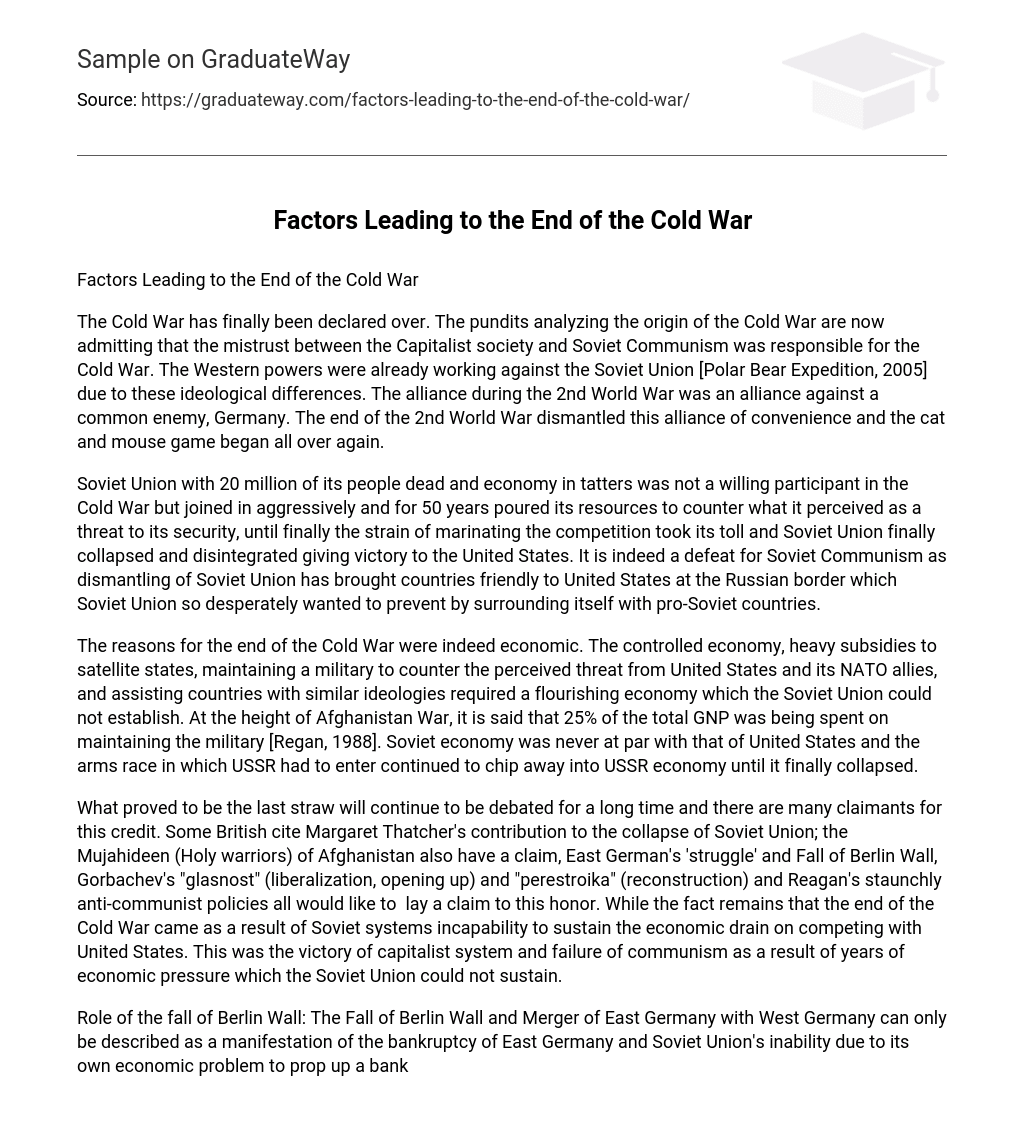The Cold War has finally been declared over. The pundits analyzing the origin of the Cold War are now admitting that the mistrust between the Capitalist society and Soviet Communism was responsible for the Cold War. The Western powers were already working against the Soviet Union [Polar Bear Expedition, 2005] due to these ideological differences. The alliance during the 2nd World War was an alliance against a common enemy, Germany. The end of the 2nd World War dismantled this alliance of convenience and the cat and mouse game began all over again.
Soviet Union with 20 million of its people dead and economy in tatters was not a willing participant in the Cold War but joined in aggressively and for 50 years poured its resources to counter what it perceived as a threat to its security, until finally the strain of marinating the competition took its toll and Soviet Union finally collapsed and disintegrated giving victory to the United States. It is indeed a defeat for Soviet Communism as dismantling of Soviet Union has brought countries friendly to United States at the Russian border which Soviet Union so desperately wanted to prevent by surrounding itself with pro-Soviet countries.
The reasons for the end of the Cold War were indeed economic. The controlled economy, heavy subsidies to satellite states, maintaining a military to counter the perceived threat from United States and its NATO allies, and assisting countries with similar ideologies required a flourishing economy which the Soviet Union could not establish. At the height of Afghanistan War, it is said that 25% of the total GNP was being spent on maintaining the military [Regan, 1988]. Soviet economy was never at par with that of United States and the arms race in which USSR had to enter continued to chip away into USSR economy until it finally collapsed.
What proved to be the last straw will continue to be debated for a long time and there are many claimants for this credit. Some British cite Margaret Thatcher’s contribution to the collapse of Soviet Union; the Mujahideen (Holy warriors) of Afghanistan also have a claim, East German’s ‘struggle’ and Fall of Berlin Wall, Gorbachev’s “glasnost” (liberalization, opening up) and “perestroika” (reconstruction) and Reagan’s staunchly anti-communist policies all would like to lay a claim to this honor. While the fact remains that the end of the Cold War came as a result of Soviet systems incapability to sustain the economic drain on competing with United States. This was the victory of capitalist system and failure of communism as a result of years of economic pressure which the Soviet Union could not sustain.
Role of the fall of Berlin Wall: The Fall of Berlin Wall and Merger of East Germany with West Germany can only be described as a manifestation of the bankruptcy of East Germany and Soviet Union’s inability due to its own economic problem to prop up a bankrupt economy.
Role of Ronald Regan: Ronal Regan’s policies were staunchly anti-communist and his support for war in Afghanistan was a contributing factor in further weakening USSR economy, but Regan can not be given credit for the end of the Cold War. The break-up of USSR came from the economic collapse and Regan’s contribution was a continuation of the policies of the Cold war. Soviet Expert, Arbatov recognized the failing of Soviet totalitarianism in comparison to the economy and politics of the West and argued that the change was overdue and would have come without foreign pressure and “the U.S. military buildup during the Reagan years actually impeded this development” [Blum, 2000].
Gorbachev’s Role: Regan had been in power for 4 years when Gorbachev came to power. The arms race spending had seriously damaged the Soviet economy which had been going on for 40 years. No one could see that Soviet Union would break up so soon after the arrival of Gorbachev. He recognized that Soviet Union’s economy could not sustain the cold war and maintenance of its satellite states. Gorbachev’s advisor, Aleksandr Yakovlev, responded to the claims of regarding Reagan being responsible for break up of USSR in the following words, “I can tell you that with the fullest responsibility. Gorbachev and I were ready for changes in our policy regardless of whether the American president was Reagan, or Kennedy, or someone even more liberal”[Blum, 2000].
Discussions & Conclusions
The break up Soviet Union was the result of failure of Soviet Communism and a clear victory for capitalist economy and United States. The break up was the result of 40 years of sustained pressure by United States and failure of Soviet economy is mainly to blame. Many socialist countries have learnt a lesson from USSR experience and market based reforms are now the norm in even communist countries such as China and Vietnam.
Bibliography
Polar Bear Expedition, 2005, American Intervention in Northern Russia, 1918-1919, University of Michigan Historical Collection, [Online] retrieved from Internet on 4 April 2007, http://www.umich.edu/~bhl/bhl/mhchome/polarb.htm
Blum, W., May 2000, Rogue State: A Guide to the World’s Only Superpower (Paperback), Common Courage Press, ISBN-10: 1567511945, 320 pages
Regan, D.T., 1988, For the Record. San Diego: Harcourt Brace Jovanovich. ISBN 0151639663





